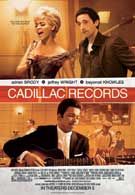Rock and roll has always been characterized by colorful characters, doing things like marrying their 13-year-old cousins or eating live bats onstage. And the people employed by Chess Records in the early 1950s, one of the first labels to bring black musicians to the mainstream, were as colorful as any. With Cadillac Records, writer-director Darnell Martin has done herself a key favor by hiring equally dynamic actors to play these early movers and shakers, from Jeffrey Wright's laconic Muddy Waters to Mos Def's twitchy, charming take on Chuck Berry. Martin's serviceable direction and plodding story might have been saved by this cadre of talent had she not handed over a key role, and at least two full-fledged musical numbers, to one of the highest-paid bad actresses working today-- one who also happens to have an executive producer credit.
Playing the troubled Etta James during a period of heavy addiction and depression, Beyoncé emotes and cries and seduces at all the right moments, but her character obscures what should have been the heart of the film. Muddy Waters, who was the first artist signed to Chess Records by his business partner and friend Leonard Chess (Adrien Brody), deserved to be the main character here, and you can't help but feel the movie was driven off the rails by its biggest star.
What's there before Beyoncé takes over is good, though serviceable and a bit amateurish in the way average biopics can be. Narrating from the present for no particular reason, Willie Dixon (Cedric the Entertainer) tells how Waters, a sharecropper, left Mississippi for Chicago and teamed up with harmonica prodigy Little Walter (Columbus Short), a young man with an explosive temper and a penchant for anything that could get you in trouble. Chess moves from bar owner to record label impresario with Waters and Little Walter as his talent, and soon they're making hits on black radio stations and even doing tours in the South. The movie's title comes from Chess's habit of buying his talent Cadillacs when they hit it big, as opposed to royalty checks. It's one of Chess's many shoddy business practices that doesn't really amount to anything in Martin's meandering script.
It's not until Berry, with his duckwalking and country-western affectations, signs on to Chess that the label really blossoms, creating hits with white and black audiences alike. With fame comes its perils for pretty much everyone involved, including Waters' multiple affairs behind the back of "his girl" (Gabrielle Union), Berry's arrest and Little Walter's multiple meltdowns. And that's even before Etta James show up to tell Chess about her absent father, famed pool shark Minnesota Fats, and seduce him on the floor of her sad, empty house.
It's hard to make the decadence-and-decline story of rock and roll feel new, and even though the figures in Cadillac Records are singing different songs, the tune is pretty much the same. The good parts mostly lie in the performances-- Brody and Wright have an easy, sparring rapport, and Wright, Def and Short are all stellar in their vastly different roles. Including his endearing performance in this year's Be Kind Rewind, Mos Def is becoming one of my favorite actors to simply spend time with onscreen. Wright, always good in smaller roles, would probably be getting all the attention here with his chameleonic performance, had a certain superstar not, quite literally, taken away the spotlight.
It's unfair to blame all of Cadillac Records' failings on Beyoncé, given the draggy pace of the script and the movie's general unwillingness to deviate from general music biz stereotypes. But the movie might have retained its shaggy charm, and been able to make up for its many flaws, had it not morphed into yet another star turn for an actress who has yet to prove any real charisma onscreen.
Staff Writer at CinemaBlend
Most Popular






